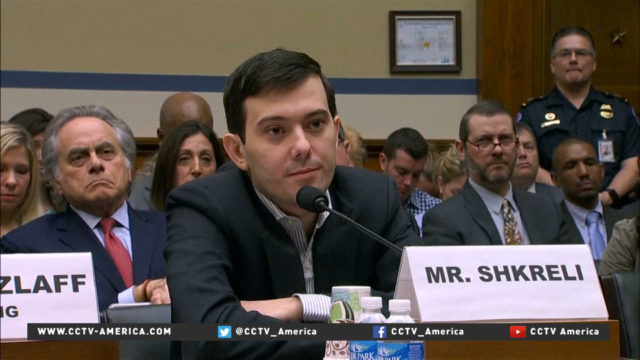The young former head of a pharmaceutical company in the U.S. was in the hot seat in front of the United States’ Congress today as he faced scrutiny, and a lot of criticism, after increasing the price of a life-saving drug by 5,000 percent.
Despite many questions before the U.S. Congress committee, Shkreli refused to answer them siting advice from his lawyer.
CCTV America’s Daniel Ryntjes reports from Washington.
Follow Daniel Ryntjes on Twitter @danielryntjes

The former head of an American pharmaceutical company has refused to answer questions during a Congressional hearing on the issue of drug pricing. Martin Shkreli is at the center of a storm of debate about the ethics of his industry, after he increased the price of one drug by over 5,000 percent.
Some call him the most hated man in America. Thursday, Martin Shkreli was summoned to appear before a powerful U.S. Congressional committee to answer questions about his actions.
As head of Turing Pharmaceuticals, he purchased the rights to the drug Daraprim, a treatment for parasitic infections, malaria and HIV. Shkreli increased the purchase price from $13.50 to $750, per pill. To the consternation of lawmakers, Shkreli invoked a U.S. Constitutional clause to avoid self-incrimination called the 5th amendment privilege.
Shkreli resigned as CEO of Turing Pharmaceuticals in December, after being arrested and charged with running his former companies like Ponzi schemes, but he denies the securities fraud allegations. Turing’s current Chief Commercial Officer, Nancy Retzlaff says the company is taking steps to make the drug more affordable.
After multiple refusals to answer questions, Shkreli was allowed to leave the committee meeting before the U.S. Congressional group. But he didn’t stay silent for long, sending messages through twitter calling the lawmakers “imbeciles”.
Those who can’t afford insurance often access health services at free clinics, but the key concern of the doctors and nurses who treat them is that their clients struggle to afford the out-of-pocket costs.
The issue of drug pricing has even entered the U.S. presidential campaign, with several candidates promising to explore reforms to make branded drugs more affordable and to speed up the approval of low-cost generics.
 CGTN America
CGTN America
